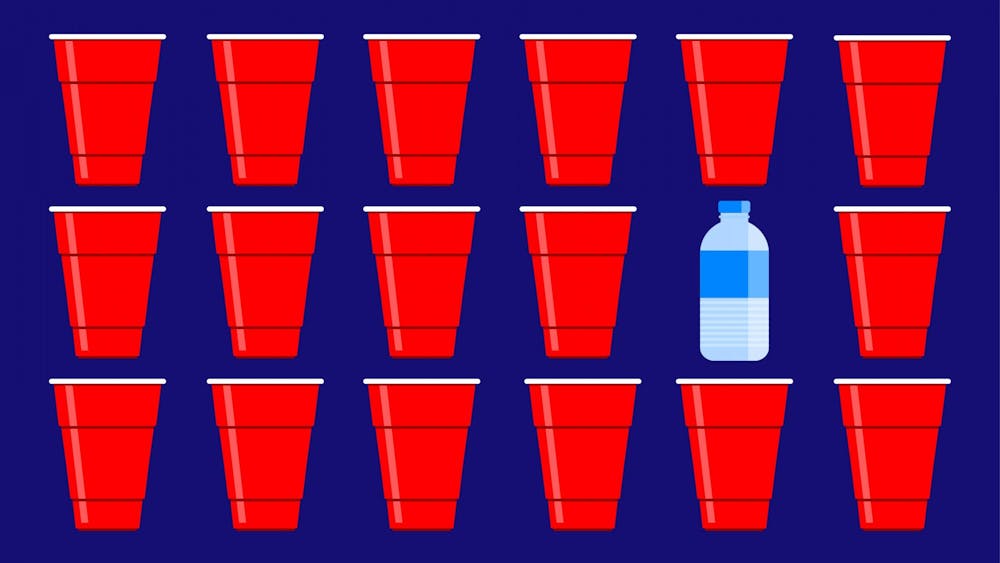Many UofSC students kick off their Fall Saturday morning with a hangover from the night before. Before they know it, it’s off to the tailgate and then a post-game celebration or pity party. It’s easy to make drinking or drug use a habit at a big SEC school. But what happens when that pastime starts accumulating consequences, like skipping class or going broke?
Consequences became reality for Allie Farrell, who graduated from UofSC’s social work department in May 2021. A self-proclaimed "alcohol addict," her addiction predated UofSC to high school, where her interest in substances began. Alcoholism runs in her family, a trait that increases her genetic risk of developing the problem herself. “I’ve always known I was going to end up in rehab, ever since I started drinking,” Farrell said.
Like so many students, the new ability to party almost anytime affected her choice to attend an SEC school. When she got to campus, the always-available parties introduced her to heavier drugs. Then, traumatic events set her on a bender. She soon started missing class.
“I wish that I had an experience that I came to on my own where I thought, ‘I need to change,’” Farrell said. Instead, a DUI the summer before Farrell’s sophomore year got her checked into a rehabilitation facility. Farrell knew then that she had a big issue. Her friends couldn't have noticed she had a problem. They too were surrounded by a party culture that normalized her behaviors.
Farrell got serious about recovery through UofSC’s Gamecock Recovery program. According to Kat James, the program’s Company Coordinator, their mission is, “to help students who are in recovery feel connected to the campus.”
The program’s services include Peer-Based Recovery Support meetings for those interested in both full sobriety and those interested in changing their relationship with substances. Another service, Recovery Coaching, offers students seeking recovery a trained support person and cheerleader.
Farrell isn’t the only former student to find help within Gamecock Recovery. Recent UofSC theater graduate, Ezri Fender’s relationship with recreational drugs went from a "social thing" to a "crutch". She wanted to disconnect from her everyday difficulties.
Fender felt exhausted and was overwhelmed with classes, extracurriculars, and her job. She finally reached her “breaking point” and brought her concerns about her relationship with substances to her therapist at UofSC, who referred her to Gamecock Recovery.
“I think the biggest hump was just getting over myself,” Fender said. Reaching out for help wasn’t easy. She “gaslighted“ herself, feeling like she was “just being dramatic” and didn’t have a real problem. Not to mention, she didn’t want to put school on hold. Fender already had supportive friends in her theater program. Soon, though, she found Gamecock Recovery to be a balance between staying at school and getting help.
The support meetings helped her feel less alone in her addiction that felt isolating. They taught her how to set boundaries, something she was never good at. Now, Fender is actively in recovery.
She also participated in the school’s STIR Program, where she saw a recovery coach. STIR focuses on harm reduction, a strategy centered around minimizing the consequences of behaviors. A lot of students could benefit from harm reduction, regardless of whether or not they have a problem.
“I would have been super lost without Gamecock Recovery,” Farrell said. “It’s still my lifeline.” Farrell is still friends with the people she met through the program. She describes it as a “bright light in this big SEC school".
James highlights that campus needs to be accessible for students with substance abuse disorder the same way that the campus must be accessible to somebody with mobility limitations. Their goal is for Gamecock Recovery to continue to be a community for students who feel they don’t get that elsewhere on campus. “People, in general, have a narrative of what college life is supposed to be like,” they said. Students struggling with substance abuse still deserve a fulfilling and enriching experience.
Even though UofSC has a reputation for partying, especially within the sizable Greek culture, not everyone drinks. According to UofSC Substance Abuse Prevention and Education, about 5% of UofSC students resist substances because they are in recovery, further emphasizing the need to help students in recovery feel less alone.
Farrell had to be open with her friends about her sobriety and often got funny looks from them. To not relapse, she found a hospitable group of friends through campus involvement and dropped her old ones. “I found what was good for me,” Farrell said.
Students who want to go sober or lessen their drug usage find it hard to overcome the stigmas surrounding what it means to be an addict. Often, people think of those with substance abuse issues as being “junkies,” which is just not the reality for most students. Students like Fender kept their high GPA, attended classes and continue extracurricular involvement, all while struggling with addiction.
James suggests that we have a more compassionate stance on addiction and recovery. Much of the media’s coverage of addiction shows only the harmful impacts of active addiction while ignoring what recovery looks like. The culture needs to understand that addiction is a disease and people aren’t choosing it for themselves. “It’s not a moral failing,” said James.
James emphasizes the power of storytelling, letting students in recovery know that it’s possible to be in recovery and be happy. Gamecock Recovery connects students that are sober. The ARISE Speaker Series brings in speakers to share their recovery stories each month.
Self-compassion is a big part of healing. Gamecock Recovery emphasizes what James calls the “all-pathways approach.” People who follow this approach believe that a person does not need to meet any certain criteria to be in recovery. “To me, it’s not helpful to say there’s a difference between students who are getting help and students who aren’t getting help,” James said. “It’s more about the choice that you’re making to move forward in a different manner.”
“You just have to have that mindset of like, ‘I'm not drinking today. I'm not using today.’ All of a sudden a year flies by and you’re like, ‘Woah, I don't even like when I think of the taste of liquor,’” said Farrell.
People in recovery can still experience cravings and go through struggles. Recovery is not linear. Fender emphasizes that you can’t just go to a meeting and check the recovery box. Still, you have to keep hope and self-respect.
For those looking to get involved with Gamecock Recovery, James suggests you reach out through email, Instagram or to visit their office on the third floor of The Strom Wellness and Fitness Center.



